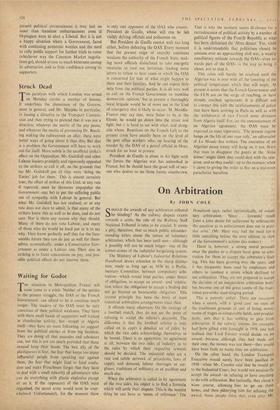Struck Dead
'THE. paralysis with which London was seized on Monday carries a number -of lessons. It underlines the clumsiness of the Govern- ment in general, and Mr. Marples in particular, in issuing a directive to the Transport Commis- sion and then trying to pretend that it was not a directive; whatever the merits of the pay pause, and whatever the merits of preventing Dr. Beech- ing making the railwaymen an offer, there were better ways of going about it than this. But that is a problem the Government will have to work out for itself. More subtle is the unofficial strike's effect on the Opposition. Mr. Gaits) ell and other Labour leaders promptly and vigorously appealed to the strikers to call it off, on the grounds that (as Mr. Gaitskell put it) they were 'doing the Tories' job for them.' This is almost certainly true; the effect of strikes of this kind, at any rate if repeated, must be (however unpopular the Government may be) to put the suffering public out of sympathy with Labour in general. But what Mr. Gaitskell has not realised, or at any rate does not dare to admit, is that many of the strikers know this as well as he does, and do not care. Nor is there any reason why they should. Many of them do not vote Labour, and many of those who do would be hard put to it to say why. They know perfectly well that for the fore- seeable future they can do just as well for them- selves, economically, under a Conservative Gov- ernment as under a Labour one. Their aim in striking is to force concessions on pay. and pos- sible political effects do not interest them.


































 Previous page
Previous page